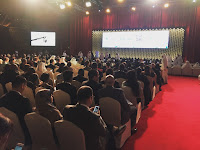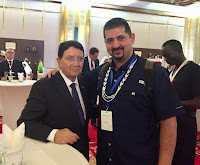Doha, Qatar is 2017’s
host for the annual U.N. World Tourism Organization’s event. This year’s theme
is “sustainable tourism.” Qatar seeks to attract tourists through its impressive pearl diving, oil drilling, and falcon raising heritage.
 |
| Is that Wayne or Garth with his backstage pass? |
I’ve never
attended a UNWTO event. The format is similar to most conferences—a
keynote speaker, several other speakers, different panels, then dinner. The
host country has an opportunity to advertise itself and demonstrate its capacity to entertain other countries and large organizations.
 |
| Main hall in Sheraton Grand Doha |
Think of it as
Middle Eastern hospitality on a large scale—one country invites a guest and proudly
shows off its home, and the next year, it accepts a reciprocal invitation. The
events work smoothly because each guest knows it will be a host one day, and
each host wants to take advantage of its time to impress other guests.
Taleb Rifai, the current UNWTO Secretary General, was this year's keynote speaker. He’s an
impressive orator, peppering his speech with the phrase, “My friends,” and
speaking in such a way that you sincerely believe he is speaking directly to
you, his dear friend.
 |
| The one and only Taleb Rifai |
He praised Qatar
for being the “most open country in the [Middle Eastern] region”—Qatar recently
waived visas for many countries—and lauded tourism’s many economic benefits. Rifai’s most interesting comment related
to “tourism phobia” in European cities like Barcelona and Venice. Despite local
complaints about tourism, according to Rifai, just one hour outside these
cities exist wineries and scenery more impressive than the city centers
themselves, but no one visits and so they remain undiscovered. Thus, the future
of sustainable tourism appears to involve greater diversity of locations and
better marketing for undiscovered gems. All countries now recognize that only developing beachfront property isn’t a sustainable approach to attract tourism and investment long-term. Consequently, the UNWTO’s members plan to use tourism to develop smaller cities and to spread tourist dollars more equitably. The really difficult question, especially if you're wary of government interference in private markets, is this: if you're a developer or hotel management company, how does a country convince you to build in a smaller location, where the number of expected tourists are much smaller than in a city center?
I asked how Qatar planned to attract tourists from all income levels, given its relatively expensive food and accommodation prices. My answer would have involved something about Doha’s world-class service and its excellent value for money when considering the level of accommodation and quality of sites, especially its museums. The gentleman answering my question referred to airline partnerships and making the cost of travel cheaper. (WOW airline, for example, offers cheap flights from major California cities to Iceland and is expanding its U.S. presence.)
I wasn't impressed with his unimaginative response. Countries in more expensive developed countries ought to subsidize
accommodation for tourists younger than 27 years old as well as city-wide bus
tours to encourage a wide variety of tourists. For example, Abu Dhabi’s bus
tour was about 70 USD, so I skipped it, perhaps missing an attraction or two I
could have recommended to my friends and readers—other potential tourists. The subsidies
could be as simple as tax credits for hostels with the subsidy/credit required
to go towards upgrading or maintaining specific items such as security,
lockers, and/or beds. The hostel would be required to charge a lower rate in
exchange for the subsidy but would still have to make a profit to stay in
business, thereby encouraging excellent customer service. Who knows? Maybe a few
young tourists will enjoy a destination so much, they will apply to local grad
schools and pay non-resident tuition rates. My point? The benefits from exchanging ideas
spontaneously and freely amongst curious people, especially young people, cannot be measured in dollars and cents, especially not short
term. If free markets are concentrating CAPEX in ways that guarantee unwelcome saturation, it's time for everyone to sit down and think outside the box.
In any case, other than Taleb
Rifai, the highlights were listening to Qatar Airways’ CEO, Akbar Al Baker, on
one of the panels (he’s very, very direct and has a wicked sense of humor); hearing a string quartet at the sponsored dinner; and holding
a falcon carefully on my arm. I also enjoyed meeting Croatia’s State Secretary of Tourism, Frano
Matusic. (Did you know Croatia derives 20% of its entire GDP from tourism?)
 |
| CEO Akbar Al Baker |
Much to my lament,
I didn’t hear any cutting-edge ideas at the conference, perhaps due to the
current Saudi-led and American-instigated blockade against Qatar. Dubai may be
one of the world’s most traveled destinations, but to prevent tourism from
becoming a “winner-take-all” game, the GCC should cooperate and market a
multi-country tour. Individually, between Abu Dhabi, Oman, Brunei, and Qatar, only
Oman currently has enough unique items to warrant an extended visit, and the battle
to outdo each other in architectural wonders can only go so far.
Even Dubai has
reason to be concerned. Most people will visit Dubai only once, and if its
future requires unlimited funding for the latest new gadget or building design,
its tourism strategy is not sustainable. Thus, a sustainable tourism future for all neighboring countries, not just GCC ones, will involve much
greater cooperation on all levels—security, planning, trade, and visas. Such
cooperation, if done properly, should lead to more individual freedom across borders, as
local countries temporarily swap visiting police, academic, and military workers to
increase cultural understanding and share more information, lowering
overall security costs and preventing a divide-and-conquer strategy.
Indeed, as far as I know, no one wants to imitate Chinese-style “tourism,” where visitors are herded into buses like cattle, given strict time limits at each destination (which inevitably leads to accusations of bad behavior—you’d take all the shrimp at the buffet, too, if you were hungry and afraid the bus would leave without you), and shown the kind of tour only North Korean travel agencies would appreciate. The Chinese travel this way to maximize their safety, especially because of the language barrier outside China. Sadly, if this “controlled tourism” approach continues, China may not produce another Jack Ma (aka Ma Yun), who gained his English-speaking skills and maverick style by seeing the world, especially Australia, on his own.
Indeed, as far as I know, no one wants to imitate Chinese-style “tourism,” where visitors are herded into buses like cattle, given strict time limits at each destination (which inevitably leads to accusations of bad behavior—you’d take all the shrimp at the buffet, too, if you were hungry and afraid the bus would leave without you), and shown the kind of tour only North Korean travel agencies would appreciate. The Chinese travel this way to maximize their safety, especially because of the language barrier outside China. Sadly, if this “controlled tourism” approach continues, China may not produce another Jack Ma (aka Ma Yun), who gained his English-speaking skills and maverick style by seeing the world, especially Australia, on his own.
In its final evaluation, if tourism cooperation is done properly, the costs of technological innovations—such as biometric passports and eye-scanning airport machines—will be shared across neighboring governments and less money will eventually be spent on security, especially weapons purchases. As more discretionary rials are freed for other purposes, governments, citizens, and private companies will feel more comfortable opening long-term visas and cross-border investments directly to ordinary individuals--not just through corporations, universities, and institutions.
The key is to balance
security and privacy. Thus far, the pendulum has shifted so far towards
security, there is no doubt Eisenhower’s famous warning has come true. The true
test of sustainable tourism will be whether it reverses global spending trends post-9/11
and creates, as much as possible, a world where the Chinese feel safe traveling
as individuals. After all, who wants a world without another Jack Ma?
© Matthew Mehdi Rafat (2017)
© Matthew Mehdi Rafat (2017)










